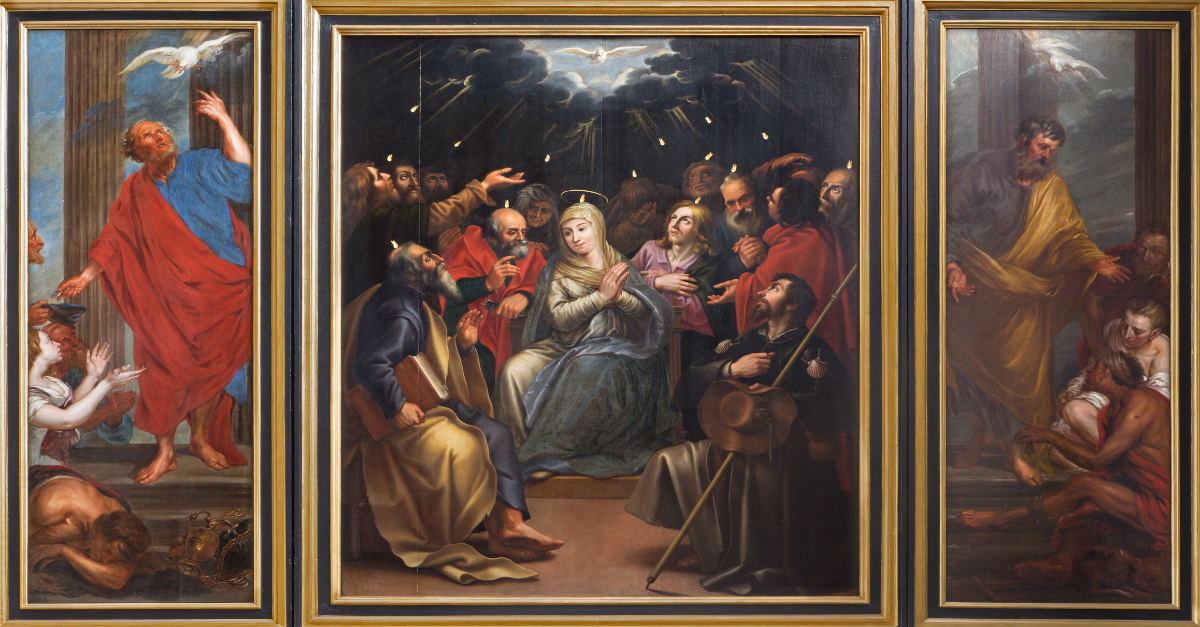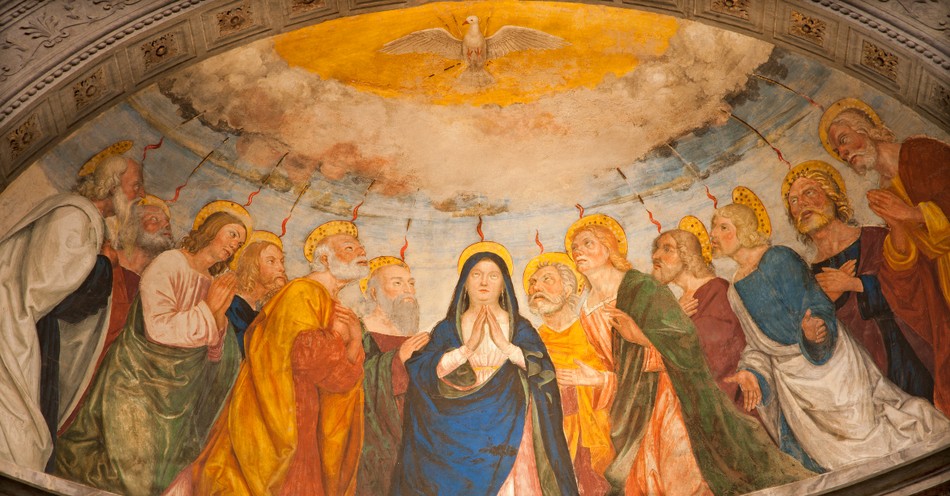Pentecost Sunday in the Christian Church is the day on which the Spirit descended upon the apostles and their followers. It is considered the birthday of Christianity as many were baptized and became believers in Jesus Christ that day, establishing the body of the church. Learn more about the Bible story of Pentecost Sunday and the traditions of Christian churches today.
"But the Helper, the Holy Spirit, whom the Father will send in my name, he will teach you all things and bring to your remembrance all that I have said to you." - John 14:26
"So when they had come together, they asked him, “Lord, will you at this time restore the kingdom to Israel?” He said to them, “It is not for you to know times or seasons that the Father has fixed by his own authority. But you will receive power when the Holy Spirit has come upon you, and you will be my witnesses in Jerusalem and in all Judea and Samaria, and to the end of the earth.” Acts 1:6-8
What Is Pentecost?
Pentecost, meaning "fiftieth" is observed only in the New Testament (Acts 2:1; Acts 20:16; 1 Corinthians 16:8). The festival so named is first spoken of in Exodus 23:16 as "the feast of harvest," and again in Exodus 34:22 as "the day of the firstfruits" (Numbers 28:26). The purpose of this feast was to commemorate the completion of the grain harvest. Its distinguishing feature was the offering of "two leavened loaves" made from the new corn of the completed harvest, which, with two lambs, were waved before the Lord as a thank offering.
The day of Pentecost is noted in the Christian Church as the day on which the Spirit descended upon the apostles, and on which, under Peter's preaching, so many thousands were converted in Jerusalem as found in Acts 2. The significance of Pentecost is made clear from the events of the day recorded in the Acts of the Apostles. Just as the appearance of God on Sinai was the birthday of the Jewish nation, so was the Pentecost the birth of the Christian Church.

The Coming of the Holy Spirit on Pentecost Sunday
When the day of Pentecost arrived, they were all together in one place. And suddenly there came from heaven a sound like a mighty rushing wind, and it filled the entire house where they were sitting. And divided tongues as of fire appeared to them and rested on each one of them. And they were all filled with the Holy Spirit and began to speak in other tongues as the Spirit gave them utterance. Now there were dwelling in Jerusalem Jews, devout men from every nation under heaven. And at this sound the multitude came together, and they were bewildered, because each one was hearing them speak in his own language. And they were amazed and astonished, saying, "Are not all these who are speaking Galileans? And how is it that we hear, each of us in his own native language? Parthians and Medes and Elamites and residents of Mesopotamia, Judea and Cappadocia, Pontus and Asia, Phrygia and Pamphylia, Egypt and the parts of Libya belonging to Cyrene, and visitors from Rome, both Jews and proselytes, Cretans and Arabians--we hear them telling in our own tongues the mighty works of God." And all were amazed and perplexed, saying to one another, "What does this mean?" But others mocking said, "They are filled with new wine." - Acts 2:1-13 ESV
The New Testament conveys the account of the Holy Ghost’s descent in the Book of Acts. The apostles and a collection of over a hundred followers were assembled when a wind filled the room. “Cloven tongues” of fire emerged above the followers’ heads, as they were filled with the Holy Spirit. This enabled them to speak in numerous languages, which helped in proclaiming the gospel throughout the world.
It is considered that the participants had collected to observe the Jewish festival of Shavuot, which is why the two celebrations have a close connection. Some cathedrals and churches constructed in the Middle Ages featured a Holy Ghost opening, which was a circular window in the roof. This is in honor of the Holy Ghost’s entry into the room from above on Pentecost.
Pentecost Sunday Traditions
Celebrations of Pentecost are held seven weeks following Easter and fifty days after Passover. This befalls on a distinct date for most Eastern and Western churches, as many Eastern churches, including the Orthodox Christian Church, observe according to the Julian calendar rather than the Gregorian calendar.
Western churches observe Pentecost with many customs. Red is used in decorations to signify the fire of the Holy Spirit. Churches will also hang banners to remember the wind that hastened into the Apostles’ room. The Holy Spirit may be expressed through flames, doves, pomegranates, or other sacred icons.
The religious services held for Pentecost depend on the church but mostly focus on the glorification and invocation of the Holy Spirit. Eastern Orthodox Churches recognize Pentecost as one of the Great Feasts of the Lord. On the day of Pentecost, the feast performs the Divine Liturgy, a special tradition within the Orthodox Church featuring hymns, readings, prayers, blessings, and recitations. Similar to Shavout, churches are adorned with greenery and flowers.
In many churches, baptisms are frequently completed on Pentecost, a biblical tradition for the holiday. Protestants and Catholics similarly will usually receive the Holy Communion. Churches may ordain clergy on this day or perform Confirmations, a ceremony that indicates a new Christian’s testimony of faith following theological instruction.
Sources
"Pentecost" - Smith's Bible Dictionary
Pentecost - willstar.com
Images credit: ©GettyImages/sedmak
Christianity.com's editorial staff is a team of writers with a background in the Christian faith and writing experience. We work to create relevant, inspiring content for our audience and update timely articles as necessary.



